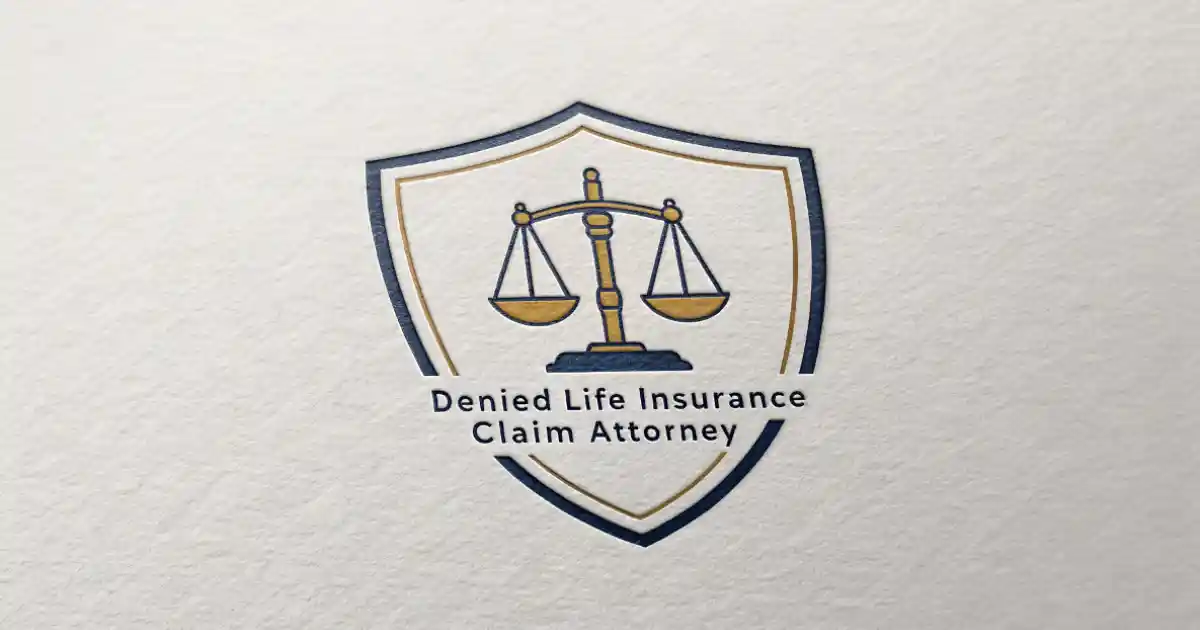It’s one thing to grieve the loss of someone you love. It’s another to open a letter, expecting comfort in the form of financial support, and find only legalese telling you that your life insurance claim has been denied.
For many families, that denial hits like a second wave of loss because behind every policy is a promise, and behind every promise is hope. When that promise is broken, you need more than explanations you need direction. That’s where a denied life insurance claim attorney comes in.
This article isn’t just a checklist or a legal lecture. It’s a roadmap built for the real people left reeling after a rejection. Whether you’re trying to understand why your claim was denied, wondering if you made a mistake, or just overwhelmed by the bureaucracy you’re not alone, and you’re not powerless.
Here’s what you’ll find ahead:
- The real reasons claims get denied (not just the ones they tell you)
- What to do immediately and what not to say to the insurer
- How to write an appeal that actually gets attention
- When it’s time to bring in a denied life insurance claim attorney and how they can turn things around
This isn’t a process anyone should navigate in isolation. But with the right knowledge and the right help you can move forward with clarity, not confusion.
Denied Life Insurance Claim Attorney: Why Claims Get Rejected More Often Than You Think
Let’s be honest most people don’t expect to ever need a denied life insurance claim attorney. Life insurance is supposed to be simple: you pay into a policy, and when the unthinkable happens, your loved ones are protected. But the reality? Insurers deny claims far more often than they advertise, and their reasons aren’t always what they seem.
The Real Reasons Behind Denials
Insurance companies have a playbook. Sometimes it’s valid like lapsed payments or missing documentation. But often, denials happen because:
A form was submitted late (even by days).
A minor health detail was misreported years ago.
The cause of death falls into a loosely defined “exclusion.”
Sound familiar? You’re not alone. Many families face these barriers after doing everything “right.” It’s not just about paperwork it’s about power. That’s why having a denied life insurance claim attorney matters. They know how to decode insurer language and challenge vague or manipulative rejections.
Common (and Questionable) Denial Tactics
Let’s break down the most frequent and frustrating denial reasons:
Non-disclosure claims: If your loved one forgot to mention a surgery from a decade ago, insurers might try to void the entire policy.
“Contestability period” traps: This two-year post-policy window is often used as an excuse to investigate and stall.
Policy technicalities: Missing beneficiaries, outdated addresses, or clerical errors can all be grounds for refusal.
Risk exclusions: Activities like scuba diving or prescription drug use can be twisted into policy violations.
Not all these reasons are fair. Not all are even legally sound. But unless someone challenges them, the denial often sticks.
FAQ Can a denial be reversed without a lawyer?
Yes but it’s rare. You can appeal a denied claim on your own, but insurers often take self-filed appeals less seriously. An experienced denied life insurance claim attorney signals that you’re prepared to fight and that you know your rights.

First Steps to Take After a Denial
When that denial letter arrives, it’s tempting to panic or worse, to give up. But before you call the insurance company or throw the papers in a drawer, stop. The actions you take in the next few days can shape everything that follows.
And no, you don’t need to be an expert. But you do need to be careful — and strategic. Here’s how to start, step by step.
Step 1: Don’t Call Read First
Your first move isn’t to argue. It’s to understand. Review the entire policy again — especially the fine print. Then read the denial letter. Look for:
- The specific reason the claim was denied.
- Any mention of the contestability period or policy exclusions.
- The deadline to appeal (some are as short as 30–60 days).
This alone can be overwhelming, especially with insurance jargon flying everywhere. That’s why this is often the best moment to speak with a denied life insurance claim attorney. They can tell you if the reason for denial actually holds water or if it’s just smoke.
Step 2: Gather Proof
Start building your case. This isn’t just about fighting the denial it’s about proving your side clearly and calmly.
You’ll want to collect:
- A complete copy of the life insurance policy
- Payment records (bank statements, premium receipts)
- Medical documents, if health was cited
- The original denial letter
- Emails or letters exchanged with the insurer
The more organized you are, the faster a denied life insurance claim attorney can step in and advocate for you effectively.
FAQ Should I write the appeal letter myself?
You can but here’s the risk: appeals without legal review often leave out critical details or tone. A good denied life insurance claim attorney knows what language resonates with insurance legal teams, and more importantly, how to frame facts in a way that demands a second look.
How to Write an Appeal That Gets Results
Writing an appeal letter might sound simple. But when you’re grieving, overwhelmed, and staring at dense policy language, it quickly turns into something else: paralyzing. And that’s exactly why many people give up too early.
Here’s the truth you can write an appeal yourself. But you’ll want to do it carefully, calmly, and with purpose. Every word matters. And if you’re working with a denied life insurance claim attorney, they’ll often draft it for you with the right tone and legal framing to actually shift the outcome.
What Goes Into a Strong Appeal Letter
Your letter isn’t a vent. It’s a structured, documented argument. Think of it as a legal puzzle where every piece supports your right to benefits. Include:
- A direct statement that you’re appealing the denial
- Policyholder’s full name and policy number
- Date of death and relevant circumstances (briefly)
- A list of documents attached (medical records, payment history, policy copy)
- A point-by-point response to the insurer’s stated reason for denial
- A respectful but firm request for re-evaluation
Avoid emotional language or blame. Focus on facts, documentation, and clear reasoning.
When a Lawyer Steps In, Everything Changes
Here’s what often happens when a denied life insurance claim attorney takes over the appeal:
- They reference state-specific statutes that bolster your claim
- They reframe medical or administrative issues to counter insurer objections
- They introduce case law or regulatory precedent pressure points no template can mimic
And crucially, insurers suddenly take your case more seriously. Why? Because attorneys signal risk legal, reputational, and financial.
FAQ Can I just use a template online?
You could but it’s risky. Templates don’t account for the unique facts of your denial, and many are outdated or too generic. A personalized letter, especially one reviewed by a denied life insurance claim attorney, shows precision and preparedness which insurers can’t easily dismiss.
When to Get Professional Help (Hint: Sooner Than You Think)
Let’s be real no one budgets for hiring a lawyer after a death in the family. Most people don’t even realize they can challenge a denied insurance claim, let alone that a legal expert might change the outcome entirely. So the question becomes: when do you stop trying to handle it alone?
The short answer? The moment you feel stuck, confused, or ignored that’s when a denied life insurance claim attorney becomes not just useful, but essential.
Red Flags That Mean You Need a Lawyer Now
Here are some common signals that legal help is no longer optional:
- The denial letter is vague, incomplete, or legally confusing
- You’re being asked for documents you’ve already sent
- The insurance company won’t respond or delays keep stacking
- They reference “misrepresentation” but won’t clarify what’s wrong
- You’ve tried to appeal and been denied again without clear reason
These aren’t just annoying they can be signs of bad faith or insurer strategy. A seasoned attorney recognizes these patterns instantly and knows how to escalate them correctly.
What Attorneys Actually Do Behind the Scenes
A denied life insurance claim attorney does far more than write a letter. They:
- Conduct a deep policy audit finding violations insurers don’t expect you to catch
- Decode and challenge complex denial language
- File formal complaints or prepare litigation if the appeal fails
- Handle all communications, so you don’t deal with legal back-and-forth while grieving
And yes, most offer free consultations, so you can gauge your case without upfront commitment.
FAQ What if I can’t afford a lawyer?
Many denied life insurance claim attorneys work on a contingency basis. That means you pay nothing unless they win your case. It’s worth asking up front and it’s one reason not to delay. The sooner they’re involved, the better your chance of a clean, swift resolution.

Real Cases Where Denials Were Overturned
It’s easy to feel like you’re the only one going through this like your case is too messy, too minor, or too hopeless to fix. But you’d be surprised how many people were in the exact same spot until they decided to fight back.
A denied life insurance claim attorney doesn’t just offer legal firepower. They bring experience from dozens, even hundreds, of similar cases — and that experience can mean the difference between silence and a six-figure payout.
Here are just a few real-life examples (anonymized for privacy) that show what’s possible:
Story #1: “They said my dad lied. He didn’t.”
Maria lost her father unexpectedly. The insurance company claimed he had failed to disclose a heart condition. But her denied life insurance claim attorney uncovered a crucial detail: the insurer had already requested and received his full medical records before approval — and approved the policy anyway. The denial was reversed in under 45 days.
Story #2: “They said my brother missed a payment. He didn’t.”
A claim was denied due to a supposed lapse in premium payment. But receipts told a different story. With help from legal counsel, the family proved the payment was made during the grace period — and the insurer’s internal processing delay had caused the issue. Full benefits were eventually paid.
Story #3: “They blamed the contestability period again.
A woman passed away 18 months after buying a policy. Her claim was denied for a minor error in her initial weight report. Her attorney argued that the discrepancy didn’t materially impact the risk profile — and was not intentional misrepresentation. The company settled shortly after legal pressure was applied.
These aren’t outliers. They’re examples of what happens when someone refuses to take a denial at face value — and has the right expert in their corner.
FAQ Will a lawyer guarantee I win?
No denied life insurance claim attorney can guarantee an outcome. But they can maximize your chances, uncover legal angles you won’t see alone, and force insurers to respond with accountability. Sometimes, just having one on your side changes everything.
Conclusion
Life insurance was never supposed to be a gamble. It was a promise one meant to protect, not provoke more pain. When that promise is broken, you don’t just need paperwork or patience. You need someone who knows the system and how to push back against it. If your claim was denied, don’t wait. Don’t hope it will resolve on its own.
Speak with a denied life insurance claim attorney who understands both the law and the emotional weight behind that policy. Because this isn’t just about money it’s about dignity, justice, and getting what your loved one intended you to have.
Frequently Asked Questions
Can I appeal a denied life insurance claim without a lawyer?
Yes but it’s not always smart. While you can write your own appeal, insurers are less likely to take you seriously without legal representation. A denied life insurance claim attorney ensures your appeal hits all the right legal and procedural notes — increasing your odds of success.
How long do I have to appeal?
Deadlines vary depending on the policy type. For employer-sponsored life insurance (ERISA plans), you usually have 60 days. For private policies, it can range from 30 to 180 days. That’s why speed matters — and why getting a lawyer involved early can preserve your options.
What if the policyholder had a health issue they didn’t disclose?
That’s not an automatic denial. The key question is whether the omission was intentional and material. A denied life insurance claim attorney can help prove the issue was minor or irrelevant to the policy’s risk — and challenge the denial accordingly.
What does it cost to hire an attorney?
Most work on contingency, meaning you pay nothing unless they win your case. During a free consultation, they’ll usually review your claim, estimate its strength, and walk you through your options without obligation.
What if the insurer won’t respond?
Silence is a tactic. Insurance companies sometimes delay hoping you’ll miss a deadline or give up. A formal letter from a denied life insurance claim attorney often breaks that silence fast or becomes grounds for legal escalation.

